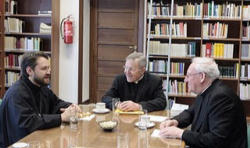Z
ziapueblo
Guest
And what about Dominus Iesus?
58 The Churches which, while not existing in perfect communion with the Catholic Church, remain united to her by means of the closest bonds, that is, by apostolic succession and a valid Eucharist, are true particular Churches.59 Therefore, the Church of Christ is present and operative also in these Churches, even though they lack full communion with the Catholic Church, since they do not accept the Catholic doctrine of the Primacy, which, according to the will of God, the Bishop of Rome objectively has and exercises over the entire Church.60
If the Catholic Church recognizes that the Orthodox have a valid apostolic succession and a valid Eucharist they “are particular Churches,” and “the Church of Christ is present and operative also in these Churches, even though they lack full communion with the Catholic Church . . .”
ZP
58 The Churches which, while not existing in perfect communion with the Catholic Church, remain united to her by means of the closest bonds, that is, by apostolic succession and a valid Eucharist, are true particular Churches.59 Therefore, the Church of Christ is present and operative also in these Churches, even though they lack full communion with the Catholic Church, since they do not accept the Catholic doctrine of the Primacy, which, according to the will of God, the Bishop of Rome objectively has and exercises over the entire Church.60
If the Catholic Church recognizes that the Orthodox have a valid apostolic succession and a valid Eucharist they “are particular Churches,” and “the Church of Christ is present and operative also in these Churches, even though they lack full communion with the Catholic Church . . .”
ZP

